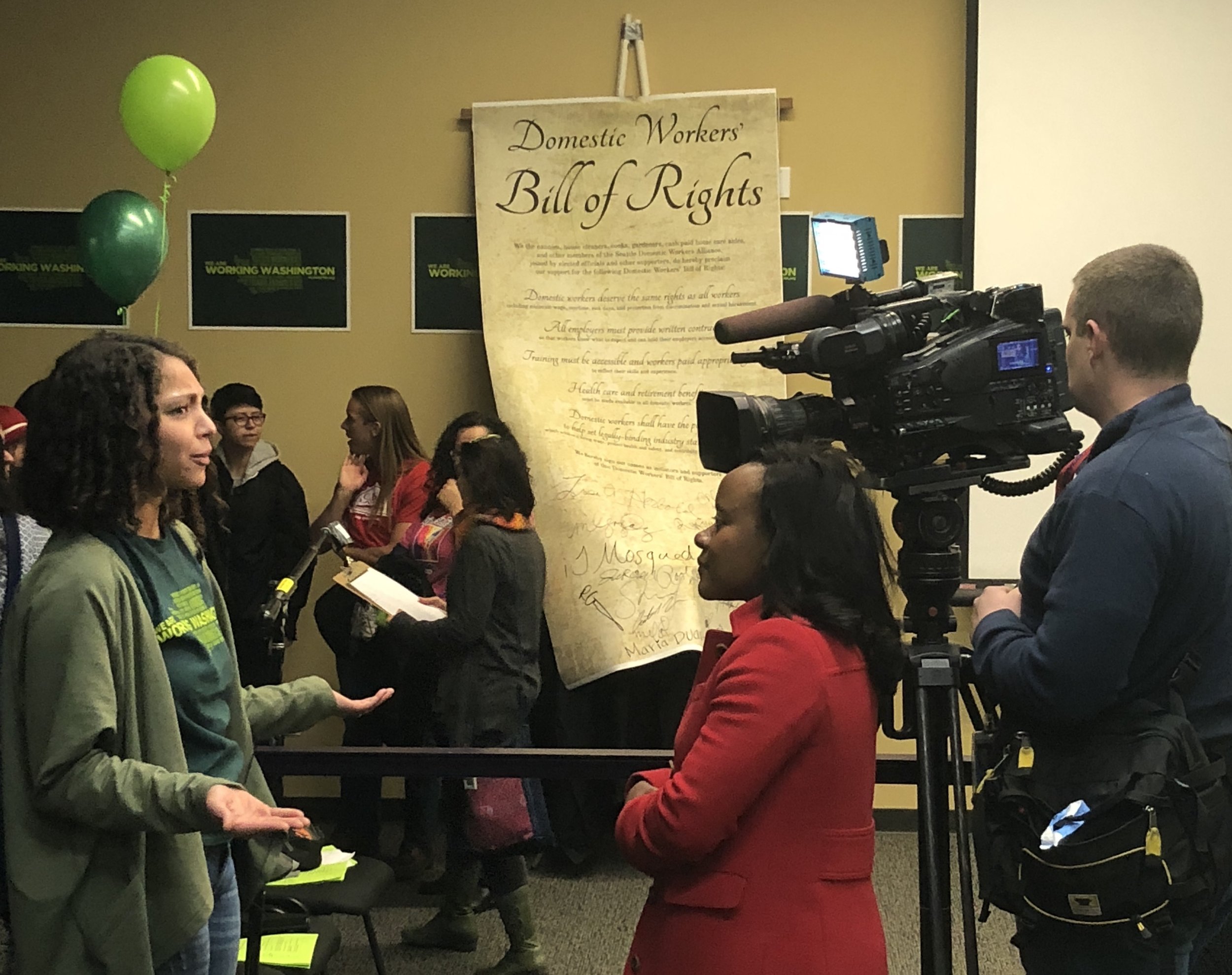Alaska Airlines and their friends aren’t happy about workers getting to take sick time when they’re sick. On Tuesday, the Air Transport Association of America, the lobby group for Alaska & other major airlines, filed a lawsuit against Washington’s Department of Labor and Industries to try to get out of giving flight attendants and pilots six and a half sick days per year
Read MoreSick time check-up
It doesn't matter what your boss says. It doesn't matter what your job title is. And it doesn't matter what city you work in. As of January 1, 2018, if you’re an hourly worker in Washington state, you get paid sick time. Take our sick time check-up: answer a few quick questions to make sure your employer is following the new sick time law, and you and your co-workers are getting what you're entitled to.
Read MoreThis look legal to you?
Pactera, a multinational tech company with offices in Redmond, WA, is advertising entry-level tech jobs...but only for people born in the US.
Read MoreWe're asking Labor & Industries to step in and effectively eliminate misleading minimum wage surcharges
We're calling on L&I to exercise its authority to clarify and enforce rules that ensure 1) Service charges can never pose as taxes or government-mandated fees; 2) Any surcharges that include the word "wage" or similar language are forbidden, because they will invariably be interpreted as intended to count towards employees’ wages, and that would be illegal under state law, and 3) Workers must be made whole for service charges which inappropriately were counted towards wage obligations, as this is effectively wage theft.
Read MoreHow baristas organized, spoke out, and won a more equitable corporate paid family leave policy at Starbucks
After months of organizing by baristas and overwhelming support from customers, Starbucks announced this morning that they are once again improving their corporate paid family leave policy. While the company’s policy still includes significant inequities between store employees and corporate employees, the company has finally established a policy that provides paid leave to all employees who become new parents. Here’s how it happened.
Read MoreMine isn't the scariest story out there...
Below is a message from Lane, a worker, mom, and Working Washington member in Seattle.
My name is Lane, and I’m writing to you today to talk to you about the gender pay gap in Washington. It’s going to take a lot of work to turn things around and make progress on equal pay for women — but there’s one way we can help make it happen now.
There’s a vote coming up on HB 1506, the equal pay bill, in the Washington House. I’d like to share my own story with you, and let you know why I support HB 1506.
My daughter Emily is 16, and I was a stay-at-home mom for most of her life. But when I got divorced a few years ago, I needed to go back to work.
Me with my daughter, Emily, when she was younger
I have a master’s degree and I’ve held management-level jobs, so I thought I’d be able to re-enter the workforce smoothly. But I was wrong.
To keep up with skyrocketing rents and cost of living in Seattle, I spent a year working towards a paralegal certificate while holding down three part-time restaurant jobs and freelance coaching and training.
I got straight As in paralegal school and served as the president of the school's Law Association. But despite this dedication and proven achievements, it took me six months of interviewing before I landed a job in a law firm.
If you've been out of the workforce entirely for 10 years, it's really hard to get in anywhere. The job of being a mom is so poorly respected, it doesn't translate into desirable work experience at the interview table.
Mine isn’t the scariest story out there, but I feel like I’m beating my head against the wall: between entry-level legal assistant job pay and side jobs catering, I still barely scrape by. It was hard enough for me to re-enter the workforce, and for women who face discrimination based on their gender or race, it’s even harder. Many women, especially women who left the workforce to care for their families, are earning less than a living wage.
If we take steps towards pay equity, it will be easier for single working moms, and other women, to get by.
Right now, women in Washington make 79 cents for every dollar earned by a man. The gap in earnings is even more severe for women of color, who are paid just 60 cents for every dollar earned by a white man.
If we want to change that, we need to update our laws to make sure employers don’t get away with paying women less and giving them fewer opportunities. That’s where HB 1506 comes in.
The bill would strengthen Washington’s Equal Pay Act with provisions like prohibiting discrimination in career opportunities, making it illegal for employers to prevent workers from discussing their wages with each other, penalizing employers who retaliate against workers for filing a complaint, and making employers pay damages to workers if they discriminate.
I’m asking you to support this bill in two ways:
Do you have a story about how the pay gap has affected your life? Click here to share your story.
Send a letter to your state legislators so they know where Washington’s workers stand on HB 1506.
If we stand together, speak out, and share our stories, we can make real change for women in Washington. The bill will be up for a vote soon— so let’s make ourselves heard!
Thanks for your support,
Lane, Working WA member
P.S. Want to learn more about HB 1506 and the other big efforts to fight the pay gap in WA this year? Click here to check out Working Washington’s web page with more info!
Saw the sign?
The real story here is how this business owner says right there in red type he’s committed to finding a way to keep prices down while also providing good working conditions as the city and state have required.
Read MoreWe still don’t have wage parity — so what are we going to do about it?
The gender wage gap and its causes have been studied fairly extensively, though a lot of questions remain unanswered. We know that some of the gap is due to discrimination, and some is due to things like job segregation, differences in household responsibilities, and other factors that may sometimes influence each other.
The gender wage gap is narrower than it used to be, but has been stubbornly hovering around the same level for years. The gap is even wider for women of color. The racial wage gap is not as well studied, and also has seen less improvement over the decades — and in some cases may even be getting worse. It’s increasingly clear that we won’t reach pay parity without actively working towards it.
Though the pay gap is a national problem, there are steps we can take at the local level to address it. Newly elected Seattle City Councilmember Teresa Mosqueda (endorsed by Working Washington) has a plan to address the wage gap in Seattle. Her pay equity platform includes a salary history ban and protections against retaliation for workers who ask why they’re getting paid less.
The Washington Legislature has introduced legislation designed to address pay equity in our state. The State House and Senate have related bills, HB 1506 and SB 5140, that would make some changes to the state’s Equal Pay Act, which has not been updated since 1943. If the bills are passed, workers will receive more protection from discrimination based on gender, like being placed into career tracks with lower compensation, including benefits. Workers will also be protected from company policies — such as “pay secrecy” policies and others — that prevent them from finding out if they have been discriminated against. In addition, workers will have access to better means of enforcement.
The thinking behind ending pay secrecy policies is that discouraging employees from discussing their pay can perpetuate gender-based pay gaps. Women can’t advocate for equal pay in their workplace if they don’t know their male coworkers are making more. In fact, several high-profile wage discrimination cases, such as Lilly Ledbetter’s suit against Goodyear, only came about when someone gave the plaintiff a tip that they were being underpaid. The National Labor Relations Act (NLRA), passed in 1935, already makes pay secrecy policies illegal in many instances. But many employers and employees don’t know about this protection, so state laws like HB 1506 and SB 5140 clarify a right many workers don’t know they have, offer better enforcement so we don’t have to rely on an unfriendly federal government, and also cover some employers that were left out of the NLRA (like government workers, agricultural workers, and railway/airport workers).
Another bill, HB 1533, would prevent employers from asking about a job applicant’s salary history, and would require employers to share the salary range for a position when an applicant asks. Even well-meaning employers can perpetuate the wage gap when they base pay on an employee’s salary history. Since women and people of color earn lower wages on average than men and white people, the practice of requiring applicants to disclose their past salaries can continue the problem. Last year, the bill passed in committee but unfortunately didn’t make it to a full House vote.
Equal pay and transparency laws like HB 1533, HB 1506, and SB 5140 are a new legislative trend in addressing the pay gap, and many states and cities across the US are passing laws to help bring us pay parity a little sooner. For example:
- Massachusetts passed a bill in 2016 banning salary history questions as well as requiring equal pay and requiring employers to allow employees to discuss their salaries.
- California has one of the strongest equal pay acts, passed last year, and may add a salary history ban this year.
- Maryland also passed very comprehensive equal pay legislation in 2016.
- Philadelphia passed a salary history ban in early 2017, though it’s currently facing a legal fight from the city’s chamber of commerce.
- New York City also passed a salary history ban in 2017.
- And DC Congressional Delegate Eleanor Holmes has introduced federal legislation banning salary history questions.
There’s no reason Washington can’t be next in the 2018 legislative session! But legislators will need to hear from you. Click here to tell your state senators & representatives that you support pay equity measures like HB 1506.
Washington workers have paid sick days!
Effective January 1st, 2018, workers in Washington State now have access to paid sick days. How will that affect you?
Read MoreNannies & house cleaners are signing on.
On Thursday, they kicked off a new campaign for a domestic workers’ bill of rights which would protect their rights at work, guarantee written contracts, and establish a city commission which includes domestic workers and has the power to set legally-binding industry standards.
Read More



